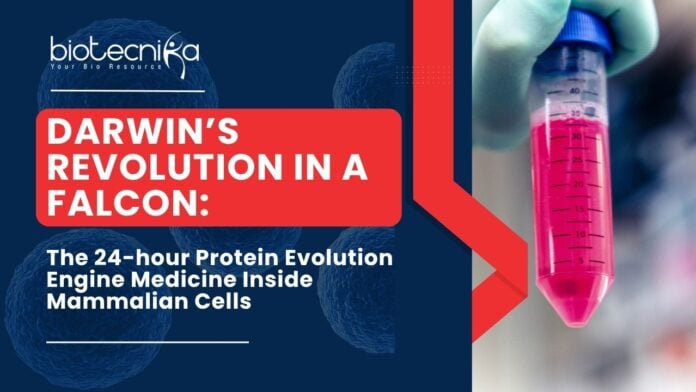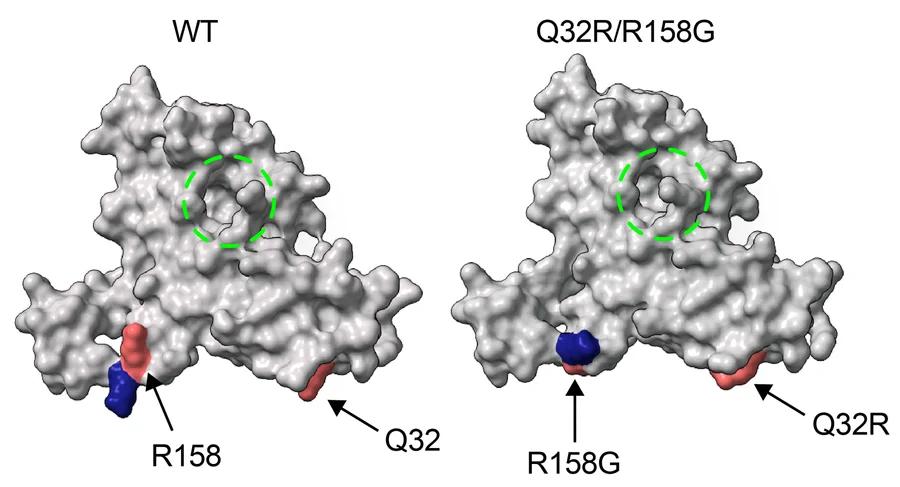Darwin’s Revolution in a Falcon: The 24-hour Protein Evolution Engine Medicine Inside Mammalian Cells
Imagine if Evolution could happen on demand, not over millennia, but in a matter of days, and not in simple microbes, but inside the very cells that make us human. That’s no longer science fiction.
In a bold leap forward, researchers from the University of Sydney’s Neely Laboratory and the Centenary Institute have launched “PROTEUS.” It is a revolutionary Biological platform that mimics the precision of viruses to evolve proteins directly within Mammalian cells. For decades, Scientists relied on Bacteria and Yeast to engineer proteins, hoping they’d behave the same way in humans. But now, “PROTEUS” brings the power of directed evolution home to the complexity of our own Biology, reshaping how we build Gene Editing tools, design Vaccines, Engineer therapeutic proteins, and develop Targeted mRNA-based Therapies.
At a time when the world demands faster cures and smarter Medications, “PROTEUS” marks the dawn of evolution by design, where nature’s rules are reimagined in the lab.
PROTein Evolution Using Selection (PROTEUS) addresses a significant limitation in traditional directed evolution techniques, namely the inability to evolve proteins in complex Mammalian systems. This new Biological machine not only overcomes those barriers but also compresses the entire process of protein adaptation into rapid 24-hour cycles, reducing what would typically take months or even years into a matter of weeks.
The research, published in the open-access journal “Nature Communications” in May 2025, has made all Genetic sequences and experimental data publicly available, positioning “PROTEUS” as a valuable academic resource for laboratories worldwide.
Overcoming the Limits of Traditional Directed Evolution
Directed evolution mimics the process of natural selection in the laboratory by introducing mutations into a Gene of Interest, applying selection pressure, and amplifying the most successful variants. This technique has traditionally relied on simple, fast-growing organisms such as Bacteria or Yeast, where high mutation rates and large population sizes make it feasible.
However, proteins evolved in these systems often fail to perform effectively in human cells due to fundamental Biological differences.
“Mammalian cells are notoriously difficult to work with,” explains Christopher Denes, a Research Fellow at the University of Sydney and co-author of the Research study. “They grow slowly, contain large and complex Genomes, and regulate protein activity through unpredictable post-translational modifications—chemical changes added to proteins after they’re produced that influence their structure, location, and function.”
This complexity has made Mammalian cells poor candidates for conventional protein engineering, until now.
What is PROTEUS and How Does It Work? – The 24-hour Protein Evolution Engine
“PROTEUS” operates as a Biological Evolution engine, which is modeled after error-prone RNA viruses. It resembles biological AI (Artificial Intelligence), a relatively new field that combines Bioengineering with ML (Machine Learning) principles to create dynamic Biological Systems. It allows repeated and rapid cycles of protein mutation and selection directly inside Mammalian cells. Each cycle comprises three significant steps, i.e., diversification, selection, and amplification, completed in just 24 hours, which is explained below:
- Gene Insertion:
Scientists begin by engineering a Gene encoding the target protein and inserting it into a custom viral Genome. - Vesicle Packaging and Cell Delivery:
The viral genome is packaged into VLVs (Virus-Like Vesicles), noninfectious shell-like structures designed to introduce the Gene into Mammalian cells. - Mutation and Selection:
As the VLVs replicate inside the cells, their error-prone replication process introduces mutations into the target Gene. These variants are expressed as proteins and tested against a synthetic Genetic challenge programmed into the host cells. Only the most effective variants, those that solve the challenge, are allowed to propagate.
“In essence, we’ve linked protein performance to virus-like survival, enforcing a version of ‘survival of the fittest’ at the molecular level,” says Denes.
Because this process unfolds across hundreds of thousands to millions of cells in parallel, it enables exploration of massive genetic diversity in a highly efficient and scalable manner.
A Mammalian-Specific Innovation – The 24-hour Protein Evolution Engine
To demonstrate its potential, the research team used “PROTEUS” to evolve a transcription factor, which is a protein that activates Gene expression. The evolved variants included beneficial mutations specifically in Mammalian cells, proving the system’s ability to generate Mammalian-specific adaptations.
“PROTEUS can produce Mammalian-specific adaptations that we wouldn’t have predicted or evolved in other systems,” Denes emphasizes.
This context-specific capability is especially valuable for Therapeutics, as many proteins designed in microbial systems lose functionality or specificity in human cells.
Why Are Mammalian Cells So Challenging?
Unlike Bacteria or Yeast, Mammalian cells regulate proteins in far more intricate ways, often through Chemical alterations that impact their behavior, stability, or interaction with other molecules. Additionally, their slow growth and sensitivity to high mutation rates make them unsuitable for conventional evolution approaches. But PROTEUS sidesteps these barriers.
“Here, they managed to circumvent Mammalian cells’ natural intolerance to high mutation rates,” says Dr. Kate Adamala, Associate Professor at the University of Minnesota’s Department of Genetics, Cell Biology, and Development, who was not involved in the study. “That’s incredibly important, because if you want to test a lot of variants, you need a huge mutation rate.”
As a Synthetic Biologist herself, Adamala sees vast potential for applying “PROTEUS” to membrane proteins, a category critical to human health and difficult to evolve.
“Membrane proteins are involved in everything from viral infections to weight-loss drugs and pain management,” she explains. “Yet evolving them has always been technically demanding. PROTEUS could change that.”
Fig: This is the predicted 3D structure of an evolved protein, featuring mutation sites [red], displaced functional groups [blue], and the drug-binding area [green circle]. Source: Alexander Cole, Christopher Denes, Cesar Moreno, et al.
Accessible, Scalable, and Open Source – The 24-hour Protein Evolution Engine
The developers of “PROTEUS” are committed to broader adoption. The platform is being distributed through Addgene, a nonprofit plasmid repository, making it available to any laboratory equipped with Molecular Biology tools and Virology training.
Moreover, the cost of running a “PROTEUS” campaign is relatively affordable, just a few thousand dollars, especially when evolving multiple Genes in parallel.
The team has filed a provisional patent in Australia and is currently exploring commercialization pathways to expand its impact beyond the academic realm.
Future Directions: Evolving Gene Editors for Human Health
One of the most exciting potential applications of “PROTEUS” lies in CRISPR (Clustered Regularly Interspaced Short Palindromic Repeats) Gene-Editing Technology. Evolving CRISPR components within Mammalian cells could lead to higher precision, activity, and fewer off-target effects, which is significant for human therapies.
“Evolved CRISPR tools would be valuable for both research and medicine,” says Denes, citing a recent study in which a CRISPR-based gene editor was used to treat a Rare Genetic Disease in a human infant within eight months of birth. “The Gene Editor they used was derived through a bacteria-based evolution method. Imagine how much better we could make these tools by evolving them directly in Mammalian systems with PROTEUS.”
The 24-hour Protein Evolution Engine – Accelerating the Evolution of Medicine
With PROTEUS, the longstanding barriers to Protein Engineering in Mammalian systems are finally being dismantled. Its ability to rapidly evolve proteins in relevant cellular environments makes it a powerful engine for Biomedical innovation, from mRNA vaccines and targeted therapies to next-generation Gene Editors.
By combining Viral Biology with Synthetic Engineering, “PROTEUS” not only simulates evolution but reshapes it, cycle by cycle, Gene by Gene, in service of human health.
As laboratories around the world gain access to this Open-Source tool, the future of customized, effective, and rapidly evolving therapeutics may be closer than ever.
With evolution now at our fingertips, the future of Medicine isn’t just being discovered, it’s being designed!
























